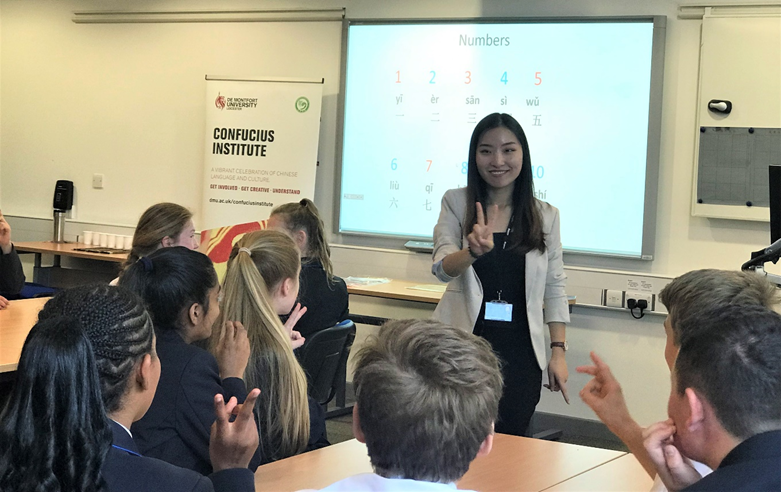DMU CI is committed to providing support to Leicestershire schools and has already worked with more than 40 schools across the county.
Formal Mandarin classes
From 2014 to 2020, the CI has provided formal Mandarin classes to more than 20 schools across Leicestershire including in Leicester city centre, Market Harborough and Melton Mowbray. A total of over 3000 school children benefit from this service.
After-school Mandarin clubs
DMU CI also provides after-school clubs to supplement formal Mandarin classes which allows students to build on what they learn during their classes. For schools who cannot schedule Mandarin into their timetable, after-school clubs help ensure that Mandarin can still be a part of their school education.

Mandarin taster lessons
DMU CI offers Mandarin taster lessons to Leicestershire schools. These events provide their students with the opportunity to have a taste of Chinese language and culture without leaving their classrooms.
Each year, DMU CI holds 15-20 Chinese language and culture tasters and workshops at DMU and Leicestershire schools, which help students learn and experience the beauty of the language and culture.

Name of school |
Type of class |
Year group |
Teaching hours per week |
Little Bowden School |
Formal |
Reception to Year 6 |
490 mins |
Folville Junior School |
Formal |
Year 3 & 4 |
210 mins |
Great Bowden Academy |
Formal |
Year 6 |
30 mins |
Club |
Mixed |
60 mins |
Mellor Community Primary School |
Formal |
Mixed |
85 mins |
Somerby Primary School |
Formal |
Year 2-5 |
120 mins |
Uplands Junior LEAD Academy |
Formal |
Year 6 |
225 mins |
Sandfield Close Primary School |
Formal |
Year 6 |
120 mins |
Club |
Year 3 & 4 |
60 mins |
Captain Close Primary School |
Formal |
Year 1-5 |
210 mins |
Elizabeth Woodville Primary School |
Formal |
Year 3-6 |
180 mins |
Alderman Richard Hallam Primary School |
Formal |
Year 1 & 2 |
240 mins |
Dovelands Primary School |
Formal |
Year 5 & 6 |
70 mins |
Club |
Mixed |
60 mins |
Leicester Preparatory School |
Formal |
Year 1-6 |
160 mins |
Abbey Mead Primary Academy |
Formal |
Year 3-5 |
90 mins |
Wolsey House Primary School |
Club |
Mixed |
60 mins |
Medway Community Primary School |
Club |
Year 4-6 |
60 mins |
Hazel Community Primary School |
Club |
Year 4-7 |
60 mins |
Spinny Hill Primary School |
Club |
Year 5 |
60 mins |
Mayflower Primary School |
Club |
Mixed |
60 mins |
Robert Smyth Academy |
Club |
Year 7-13 |
180 mins |
Welland Park Academy |
Club |
Year 7-9 |
50 mins |
Madani Girls School |
Club |
Year 7-11 |
120 mins |
Leicester High School for Girls |
Club |
Year 7-13 |
60 mins |
Manor High School |
Club |
Mixed |
60 mins |


